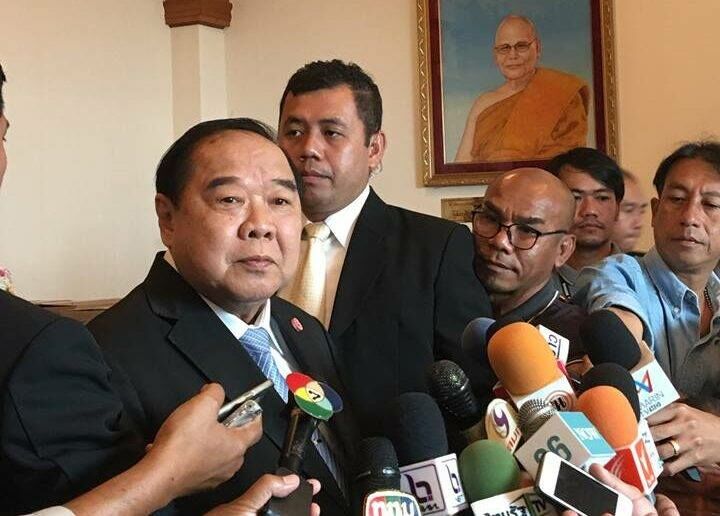Deputy PM Prawit denies nap claims, insists he was just grounded

Lt. Gen. Patchasak Patirupanon, assistant spokesperson to the Deputy Prime Minister, denied General Prawit Wongsuwan was asleep during the House of Representatives meeting yesterday. Lt. Gen. Patchasak reckons the 77 year old was looking down at the ground and looking up, not sleeping.
The picture of the deputy PM allegedly snoozing caused much mirth and merriment on Thai social media as “Uncle Pom” has been caught on several occasions napping at inappropriate times.
Indeed, the picture raised health concerns for the deputy PM. Dr Rungsrit Kanjanavanit, from the Department of Medicine at the Faculty of Medicine, Chiang Mai University, alerted to the possible signs of Obstructive Sleep Apnea (OSA). He advised a sleep test and, if severe, the use of a Continuous Positive Airway Pressure (CPAP) machine.
Dr Rungsrit Kanjanavanit shared a post featuring Deputy PM Prawit on February 5, earlier this year, in a Parliament meeting room on Facebook, expressing concerns over his health condition. His concern was due to Prawit’s frequent daytime somnolence, a symptom associated with OSA, a sleeping disorder characterised by intermittent pauses in breathing during sleep. Dr Rungsrit said…
“From a doctor’s point of view, signs like these pose a concern. Daytime somnolence is one symptom of sleep apnea or nocturnal obstructive airway blockage, a condition known as snoring or Obstructive Sleep Apnea (OSA).
“The condition leads to alternating pauses in breathing throughout the night, preventing deep sleep. This subsequently causes the body and the mind to lack adequate rest, and it leads to high blood pressure at night or nocturnal hypertension. Every morning, patients wake up feeling unrefreshed, with the mind not being alert.
“If you have these symptoms, don’t ignore them. They have adverse long-term effects on your health. They increase the risk of cardiac arrests, strokes and so on.”
Dr Rungsrit suggested a precautionary step for people could take who exhibit these symptoms. People with such symptoms should undergo a sleep test, also known as a polysomnography. If they’re diagnosed with severe OSA, they’re advised to use a Continuous Positive Airway Pressure (CPAP) machine as a remedy.
This equipment is worn while sleeping and helps maintain a steady, continuous stream of pressurised air into a person’s respiratory system. This prevents the airway from collapsing or becoming obstructed, allowing for comfortable and uninterrupted sleep.
Meanwhile, just for the record, Deputy PM Prawit was not napping, dozing, sleeping or resting his eyes, right?
Latest Thailand News
Follow The Thaiger on Google News:


























